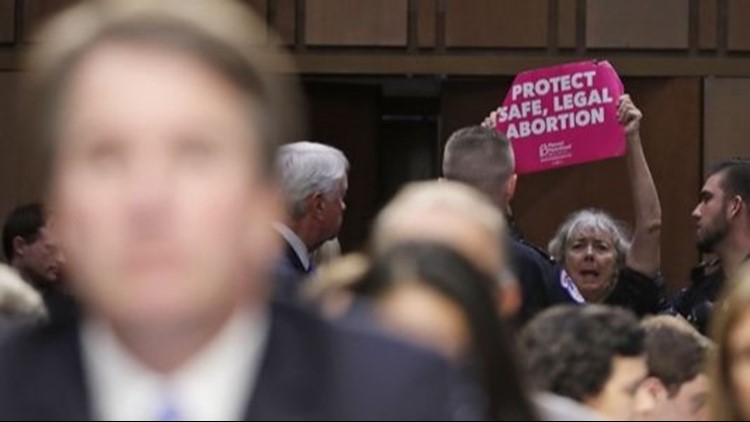WASHINGTON — Christine Ingles wore a black dress, her mouth covered with black duct tape as she trudged silently in a line of similarly dressed women through the Hart Senate building Friday.
"It was a funeral procession for women's rights," said Ingles, 65, of Northville, who traveled to the Capitol last week to protest Judge Brett Kavanaugh's nomination to the U.S. Supreme Court. "We see women's rights getting buried, going back to the '50s and we're not going to be silent anymore.
Women's reproductive rights activists who oppose the nomination of Judge Brett Kavanaugh to the U.S. Supreme Court wear black veils and tape over their mouths outside the hearing room during the Senate Judiciary Committee's confirmation hearing on Kavanaugh, in Washington, D.C., Sept. 7, 2018. EPA-EFE/MICHAEL REYNOLDS (Photo: MICHAEL REYNOLDS, EPA-EFE)
"They've been trying to silence us. ... They're trying to shove us back in the box, put us back in the kitchen. ... I'm not going back."
Inside the second-floor chambers where the Senate Judiciary Committee hearings stretched into a fourth day Friday, shouts interrupted the questioning.
"SAVE ROE, VOTE NO!" one woman yelled. Another woman, wearing a red bandanna in the style of Rosie the Riveter, joined her: "HEALTH CARE IS A HUMAN RIGHT!"
U.S. Capitol Police remove a protester from the hearing room during the second day of Supreme Court nominee Judge Brett Kavanaugh's confirmation hearing before the Senate Judiciary Committee on Capitol Hill Sept. 5, 2018. in Washington, D.C. Kavanaugh was nominated by President Donald Trump to fill the vacancy on the court left by retiring Associate Justice Anthony Kennedy. (Photo: Chip Somodevilla, Getty Images)
Senators stopped speaking mid-sentence. Officers lining the walls of the chamber pounced on the women, dragging them out of the large wood-paneled room.
Despite the theatrics, this wasn't chaos. It was an organized effort to disrupt and delay the confirmation hearings. Many risked arrest.
"I’ve never been arrested before this week," said Stephanie Kenner, a Detroiter who moved last month to Washington. "Now I have — twice.
Stephanie Kenner, 30, a Detroiter who moved last month to Washington, D.C., protests during the Women's March on Washington on the day after President Donald Trump's inauguration on Jan. 21, 2017. (Photo: Kenner family photo)
"The escalated response is required," said Kenner, who is 30 and was part of the organizing committee for last year's Women's Convention in Detroit. "You have to do something out of the ordinary when things are out of the ordinary."
Michigan women among protesters
The Women’s March organizers are a steady force, a persistent group that doesn’t always gain national exposure for its efforts to pressure Republicans and thwart their conservative agenda. Yet they’ve made it clear they’re not going away as they find new and different ways to voice their often loud objections, sometimes coordinating and teaming up with other activist groups.
Women's reproductive rights activists who oppose the nomination of Judge Brett Kavanaugh to the U.S. Supreme Court wear black veils and tape over their mouths outside the hearing room during the Senate Judiciary Committee's confirmation hearing on Kavanaugh, in Washington, D.C., Sept. 7, 2018. EPA-EFE/MICHAEL REYNOLDS (Photo: MICHAEL REYNOLDS, EPA-EFE)
"CANCEL KAVANAUGH!" Phoebe Hopps, president and founder of Women's March Michigan, chanted at Wednesday's hearing before being dragged out of the chamber and arrested with other protesters.
Hopps couldn't stay home in the northwestern Michigan town of Kewadin while the Senate considered Kavanaugh for a seat on the highest court in the land.
"I told my husband that I had to get to D.C. because I knew what was on the line," she said. "I used my airline (frequent flier) miles. My husband asked, 'Don’t you want to save these for a nice vacation?' And I was like, 'No! I need to be in D.C. right now.' It’s worth it. ... We need woman power."
Sumaiya Ahmed Sheikh, left, poses with Phoebe Hopps, Stephanie Kenner and Fatima Salman for a photo at Detroit Metro Aiport, where they organized a January 2017 protest against the Trump administration's travel ban. (Photo: Kenner family photo)
Like Hopps, many of the protesters who disrupted the Kavanaugh hearings last week were not first-time activists. They also rallied against the separation of immigrant families at the border of the United States. They helped young students organize massive rallies to counter gun laws. They rose up against the travel ban and helped boost women nominees in political races across the nation. They held gatherings in support of women's reproductive rights and access to health care.
Women's March grew out of the 2016 election of Donald Trump. Its first event was the massive Women's March on Washington — with hundreds of sister protests around the world — on the day after Trump's 2107 inauguration.
"I think we all realized that we hadn't been paying attention to all these issues until it was too late. It took one single enormous act for all of us to wake up – President Trump in the White House," said Alex Dodds, 34.
Dodds attended the first Women's March event in 2017 and helped form a local group in the Washington area to keep up pressure on the Trump administration. She rallied against Kavanaugh last week and said his nomination could be one of the most long-lasting and encapsulating decisions the Trump administration and Republicans would make.
"I think we've learned there are a lot of intersections of issues, whether it be women's health to immigration to guns, and Kavanaugh will have a huge deciding factor on all of them," she said.
Women's March, multi-tiered activism
It seems at every turn, the Women's March organization has taken a stand against the Trump administration's controversial policies, sometimes headlining events and other times backing up or partnering with other activist groups in an attempt to slow or place a roadblock on the president's agenda.
Women's March organizers paired with students in Parkland, Florida, and across the nation after the February high school shooting, which killed 17 people, and assisted in planning both the school walkout protests and the March For Our Lives rallies.
"We played a very strong role in organizing and mobilizing youth across the country and in fact from there, in the aftermath of that launch, we put out a call and said, 'Hey, who wants to start a youth chapter?" said Rachel O'Leary Carmona, chief operating officer of Women’s March National. About 170 local Youth Empower chapters were formed after that with an aim to register voters and create transformative social change in neighborhoods across the nation.
Angry protesters interrupted Supreme Court nominee Brett Kavanaugh's confirmation hearing for four days to vent their grievances over potential changes for abortion rights, health care, gun control and other issues. (Photo: Getty Images)
It's not always marches. Sometimes the group leads a letter-writing campaign or takes over a lawmaker's office. Other times, like during the Kavanaugh hearings, it's showing civil disobedience and getting arrested.
"It’s a spectrum and it’s a tactic and it’s one that we have deemed necessary because of the serious encroachments on civil and human rights that the Trump administration has performed," O'Leary Carmona said.
She added the first march started a movement that has grown over time into an intricate network, many might call its members part of the resistance.
"There are people all across the country and in fact all across the world who are working in collaboration to move the needle on issues that we articulated in our unity principles," she said. "It’s really easy to look at the headlines and say they’re here and they’re there and there’s these big mobilizations, but our chapters are really building power and pushing work in communities all around the world."
A women's reproductive rights activist protests Judge Brett Kavanaugh's nomination to the U.S. Supreme Court during the Senate Judiciary Committee's confirmation hearing in the Hart Senate Office Building in Washington, D.C., on Sept. 5, 2018. (Photo: MICHAEL REYNOLDS, EPA-EFE)
The group and those like it have become a thorn in the side of Republicans, including the president, who recently suggested in an interview that protesting should be illegal.
After seeing the protesters who gathered for Kavanaugh's hearings, Trump told the Daily Caller, a conservative website, "In the old days, we used to throw them out. Today, I guess they just keep screaming.
"I don’t know why they don’t take care of a situation like that," Trump said. "I think it’s embarrassing for the country to allow protesters. You don’t even know what side the protesters are on."
That sentiment is part of the problem, Kenner said. She called Trump’s opposition to the protesters “terrifying. In a nutshell that’s dictatorial. … Protest is the bedrock of American history. It is how our nation started and it’s critical to any democracy. The fact that he said that is not surprising but chilling.
"Regardless of what happens, I’m glad that so many people have stood up to say this isn’t normal. This isn’t appropriate, and we are concerned and we have a right to speak out on it."
Women's reproductive rights activists opposed to the nomination of Judge Brett Kavanaugh to the U.S. Supreme Court protest wearing black veils and tape over their mouths outside the hearing room during the Senate Judiciary Committee's confirmation hearing in Washington, D.C., Sept. 7, 2018. President Trump nominated Kavanaugh to fill the seat of retiring justice Anthony Kennedy. EPA-EFE/MICHAEL REYNOLDS (Photo: MICHAEL REYNOLDS, EPA-EFE)
The Women's March organization has continued to attract followers like Barbara Bearden, who was one of the many arrested throughout the Kavanaugh protests.
Bearden yelled "NO TRUMP PUPPET!" before she was arrested by officers. She says the $35 fine and discomfort of being handcuffed were worth it to voice her opposition to Kavanaugh's appointment.
Wearing a "Be a Hero" T-shirt outside the Hart Senate building, Bearden said she didn't know whether the protests would change the minds of any lawmakers during the hearings, which are over for now. The committee is expected to vote on his nomination in two weeks, leaving time for a full Senate vote before the high court’s 2018 term start on Oct. 1.
Still, Bearden refused to sit on the sidelines of history.
"When I look back at this point, I don't want to remember watching the news and not doing everything in my power to stick up for my beliefs," Bearden said. "So no, I don't know my actions will change things, but I would rather fight tooth and bone then let these moments go by without trying."
Ingles said she's a fighter, too. She has been arrested 11 times protesting in support of the Affordable Care Act and Deferred Action for Childhood Arrivals (DACA), rallying against family separations during this summer's immigration crisis and most recently in the confirmation hearing room opposing Kavanaugh's nomination.
"I'm just a little old grandmother who decided I couldn't let this happen," she said. "I went to Washington on my own.
"I try and do something. Sometimes, you have to get arrested. Sometimes, you have to walk down down a hallway with tape over your mouth to resist."
Contact Kristen Jordan Shamus: 313-222-5997 or kshamus@freepress.com. Follow her on Twitter @kristenshamus.
►Make it easy to keep up to date with more stories like this. Download the WZZM 13 app now.
Have a news tip? Email news@wzzm13.com, visit our Facebook page or Twitter.



